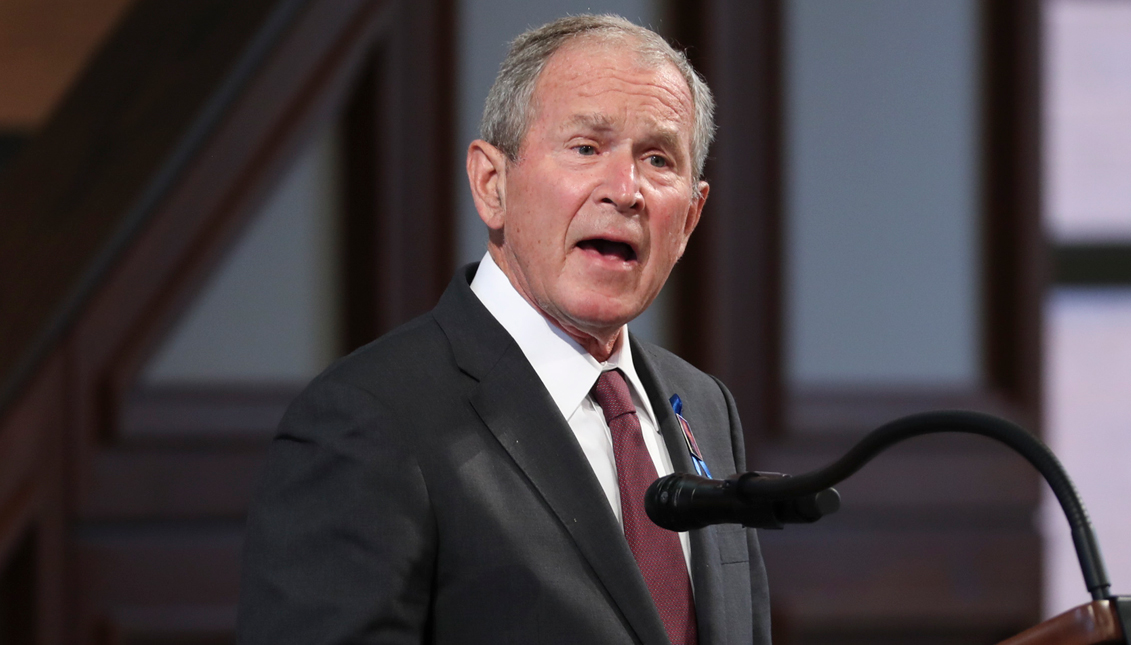
The fight for immigration reform has a new, yet unpopular advocate
George W. Bush is hoping that people become more sympathetic to reform through a book of paintings of immigrants.
Former president George W. Bush had an exclusive interview with Fox News recently to discuss his new book, Out of Many One: Portraits of America’s Immigrants.
The book includes 43 oil paintings of immigrants, done by the 43rd president himself, and Bush also writes about the contributions they have made to this country.
Some of the people featured in the president’s latest work are Hollywood actor Arnold Schwarzenegger, former Secretary of State Madeleine Albright and Paula Rendón, Bush’s nanny growing up, who he considered to be his second mother.
The touching stories of the struggles individuals faced in trying to get ahead in America are part of the author’s effort to get involved in the discussion around immigration reform.
Ever since the release of his book last month, he has offered his opinion on the issues impacting immigrant communities when promoting it, and scolded the federal government for a lack of action.
"You’re not going to solve this if there is politics," Bush said. "If you think about where we are right now, you’ve got people on one side of the aisle blaming the former president, and people on the other side of the aisle blaming the current president. And, the truth of the matter is, the system is broken because Congress has failed to act."
He is correct in his assertion that Congress has not agreed on much surrounding this policy matter in recent history.
President Barack Obama started the Deferred Action for Childhood Arrivals program (DACA) in 2012, and it allowed nearly 800,000 undocumented immigrants who came to the U.S. as children to lawfully seek work permits and attend higher education institutions.
In the first two months of the Biden presidency, Secretary of Homeland Security, Alejandro Mayorkas, allowed Venezuelan immigrants to apply Temporary Protected Status (TPS).
This temporary protection from deportation was given to Venezuelans in the America because of the humanitarian crisis their home country is experiencing under the regime of president Nicolás Maduro.
These have been the two most significant achievements on immigration in the 21st Century, but it does not mean that more has not been attempted.
Towards the end of his time in the White House, Bush heavily lobbied for the Comprehensive Immigration Reform Act of 2007.
It ultimately died in the Senate due to it enforcing English as the country’s official language, limiting family reunification visas to nuclear family members and labor unions fearing that the provision on a guest worker program would create an underclass of cheap labor.
When Biden was vice president, he advocated for an extension of DACA, known as Deferred Action for Parents of Americans and Lawful Permanent Residents (DAPA).
It would have offered a road to legalization for undocumented parents whose children are legal residents. The Migration Policy Institute estimated that if the policy was implemented, 5.2 million people would be eligible.
The current occupant of the White House and former president Donald Trump have received blowback from their political opponents for their record on immigration, but much of it is warranted.
During his time in office, Trump took multiple actions that went against the interests of immigrants.
He pushed for funding for a border wall with Mexico, terminated the DACA program and separated families who were seeking asylum at the border as part of his “Zero-Tolerance” policy.
As a senator, Biden voted for an additional 700 miles of fencing along the southern border and the Homeland Security Act of 2002, which created the Immigration and Customs Enforcement (ICE).
While he served in the Obama administration, the U.S. deported over 3 million immigrants, and this is more than any presidency in American history.
Biden plans to deliver on his campaign promise of passing reform through the U.S. Citizenship Act of 2021, which was introduced into both legislative chambers in February.
The bill intends to invest in Central America, address green card backlogs and provide a pathway to citizenship for undocumented immigrants as well as those on TPS and DACA.
Bush does not believe that this is the way to move forward with reform.
RELATED CONTENT
"I don’t think Congress is going to be able to get it all done with one comprehensive bill. I think there needs to be a piecemeal approach so that people can gain confidence in the ability to work with the other side," he explained.
It will be difficult for Republicans to listen to Bush given his general unpopularity with American voters, and Donald Trump becoming the face of the party.
The 43rd president dragged the nation into two wars in the Middle East, mismanaged the government’s response to Hurricane Katrina, and failed to stop the banking crisis that led to the Great Recession.
He left office in 2009 with an approval rating of 34% and reached his all time low of 25% in October 2008, according to Gallup.
Bush does not hold much credibility on the issue of immigration reform aside from his recent advocacy.
He urged for the creation of the DHS in the wake of the September 11th attacks and ICE was born within the department in 2003.
Secretaries of the federal department defended workplace raids and these traumatizing policies were partly responsible for Bush deporting as many as 2 million undocumented immigrants, which is only second to his successor.
Rep. Liz Cheney, the daughter of Bush’s Vice President Dick Cheney, was recently replaced as the House Republican Conference Chair for not buying into the narrative that the 2020 election was littered with fraud and stolen from Trump.
House Minority leader Kevin McCarthy said prior to the change that conservative delegates in the lower chamber doubted that Cheney had the ability to “carry out the message” of the party.
That message presumably means backing the previous president no matter what.
In the time between him leaving office and the release of his book, the 43rd president has silently promoted immigration reform proposals through the George W. Bush Presidential Center.
On its website, it supports policies like citizenship for DACA recipients, an increase in the amount of refugees the U.S. admits every year, and working with Mexico and Central America to address the root causes of migration.
Although he is a former president, Bush does not have much influence in the GOP, and many members are still spouting Trump’s anti-immigrant rhetoric as they try to coalesce around his image ahead of the 2022 midterm elections.
These two factors make it hard to imagine Bush becoming the figure who will sell conservatives on immigration reform during these polarizing times.











LEAVE A COMMENT: